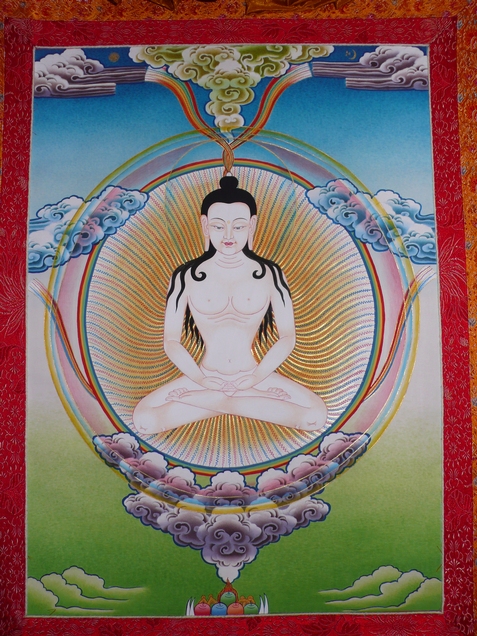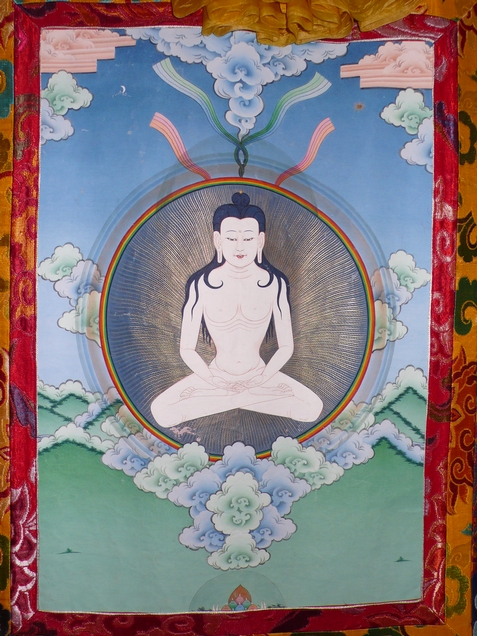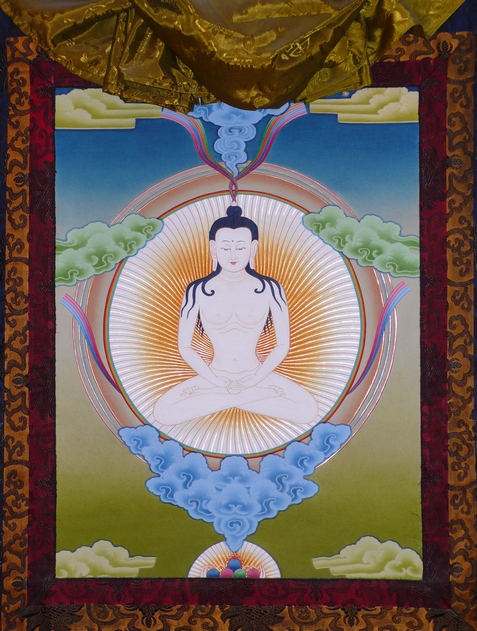www.bonpo-arts.com
Hauptmenü
- Homepage
- Bön
- Thangkas
- Tonpa Shenrab Miwoche
- Sherab Chamma
- Shenla Okar
- Tapirhitsa
- Drenpa Namkha
- Tsewang Rigdzin
- Sidpa Gyalpo
- Yeshe Walmö
- Sangchok Gyalpo
- Zhang Zhung Meri
- The emanation of the peaceful and wrathfull deities
- Gyuma Chenmo (Dream-Dakini)
- Seljé Dö Drelma (Sleep-Dakini)
- Thugje Khundul (Tummo-Dakini)
- 5 Elements (Element-Dakini)
- Statues
- What is Bon?
- Thangkas
- Books
- Projects
- Internet-Workshop
- Links
- Guestbook
- Contact
Tapirhitsa
Bön > Thangkas
"According to the traditional account in the Zhang Zhung Nyan Gyud, Tapihritsa was born in the eight century. His father was Rasang Lugyal and his mother was Sherig Sal. He received teachings through the telepathic-mind and oral transmissions from his father (Rasang Lugyal) and from the great master Ponchen Rasang, but in particular he was the disciple of the Siddha and twenty-fourth lineage master of the oral transmission of Zhang Zhung Tsepung, Dawa Gyaltsen. He practiced austerity for nine years on the rocky mountain Tagtab Sengei Drag, during wich time the silence was never broken by human speech, and obtained the ordinary and supreme attainments. At the end of his life, he achieved the rainbow body, entering the totally purified condition without leaving physical remains. For himself he realized the state of bonku, for others the state of tulku, manifesting in visible form to reawaken those who had the blessing of seeing him. His physical manifestation was not limited and he had the capacity to transform into different shapes. After obtaining the rainbowbody, Tapihritsa reincarnated as a child to teach his two main disciples, Gyerpung Nangzher Lodpo and Mo Yungdrung.
Gyerpung Nangzher Lodpo belonged to the illustrious Gurib family, that boasted many lineage holders. His father was Gurib Bumed, his mother Mangorza Droma. He received instructions and teachings from the master Zepung Dawa Gyaltsen and from many scholars. He was a great scholar, perfectly versed in all the doctrines of the "nine Ways" (of Bon). He practice austerity and kept all the vows. He obtained great power through the practice of the Yidam Meri (take a look in the Menue) and became royal priest to the king Ligmincha of Zhang Zhung.
After the murder of King Ligmincha by king Trisong Detsen of Tibet, he hurled magic bombs at Trisong Detsen, thereby saving the Bon-teachings by forcing the Tibetan King to refrain destroying the Bon texts, so that the Zhang Zhung Nyan Gyud, which he had compiled, did not have to be hidden and rediscovered as terma.
Nangzher Lodpo had become very proud because of his great power and fame and it was to overcome his pride that Tapihritsa appeared to him in the form of a child and released him from all the chains of attachment to his ego, whereby he was able to contemplate his mind in the condition of equipoise and achieve perfect supreme realization and became an omniscient Buddha.
The child Tapihritsa came to Mo Yungdrung , who was very wealthy, and told him he was begging, because he could not find any work, so the rich practitioner offer to let him stay with his family as a servant looking after the animals.
The boy was very intelligent and sharp in his work and was given the name Nyeleg. At that time Nangzher Lodpo was in retreat in a nearby cave, sponsored by Mo Yungdrung. One day Nyeleg was returning with his bag from taking the animals to graze in the mountains when he saw Nangzher Lodpo come out of his cave. Nyeleg prostrated and paid ninfold respect in the traditional way. The master noticed that the boy was trained in the doctrine and asked him: "Who is your master? What meditation do you practice? What are you carrying in your bag? Why are you behaving this way? Where are you going?"
Nyeleg answered: " The view is my master. I practice the nonconceptual state. I meditate on everything I see in the three dimensions (of existence). I am carrying thoughts in my bag. My behavior is to work as the servant of the sentient beings. I am going nowhere." The master was disappointed. He felt proud of being an important master and felt that the child's answers had been disrespectful. He rejoined skeptically, "If the view is your master, it means that you have no master. If the nonconceptual state is your practice it means, that you don't need food and clothes. If your meditation is all the visions of the three dimensions, it means you don't need to meditate: without meditation you will obtain complete realization. If you are carrying thoughts in your bag, it means you don't have desires." So the boy said, " If you do not understand view as the master, then who taught the primordial Buddha?" He meant that in order to understand the true condition, there is no need of a master; the master explains and confirms to the practitioner his experience of his own innate wisdom, something the practitioner already knows; there is nothing new that he can teach him. "My practice is the nonconceptual state because in this base there are no thoughts: conceptual views are not meditation practice. My practice is the visions of the three worlds: in the true nature there is no bias. If there were it would not be meditation. If I am carrying thoughts in my bag, it means that desires are finished, so there are no thoughts. If you have no concepts, you understand the meaning. If my practice is to be the servant of all beings, it means all the experiences of bliss and suffering are of one taste, and experiencing the nonseparation of good and bad is my practice."
Nangzher Lodpo became annoyed and said, " If you are so intelligent, tomorrow we must debate in front of the king. " The boy laughed loudly and said, "Cause and effect is ignorant understanding. Great meditators who keep thoughts imprisoned and controlled are drowsy and sleepy when they meditate. Language and the logic of philosophy are like weapons and dark nets.
Debating is only verbal concepts and Tantric Practice is transforming the mind and not leaving it in its nature. Learned scholars have meaningless understanding, and their view and meditation are like bubbles, mere words without application in practice. All these are not real practice; the ultimate state is unconditioned. There is no practice to do, there are no obscurations, and once you have true understanding there is no more that has to be forced or changed."
There are three ways to explain things to people: you can point out their mistakes to the, which is not the best way; you can remain silent, because if people ask many questions and you do not answer, they may understand something that way; or you can act the same way they do. That is what Nyeleg was doing: he was reacting to the questions and answers he was receiving. He was criticizing Nangzher Lodpo, who got angry and said, "Tomorrow we will debate in front of the king. If you win, you will become my master. If I win, I will punish you." Then suddenly Nangzher Lodpo recognized the boy as an emanation and fell unconscious. When he regained consciousness, he confessed his negative actions to Tapihritsa. Meanwhile, as all the animals were wandering loose and being eaten by wolves, Mo Yungdrung came and started berating the child, but Nangzher Lodpo told him, "You should not get angry, because he is a great master and is very important for us." So the both were upset and apologized for the way they had spoken to the boy and then fainted. When they regained their senses, Tapihritsa had risen into the sky and was sitting in space, surrounded by rainbow circles and laughing. Then the two disciples sad down and Tapihritsa started to impart his last teaching. Although Nangzher Lodpo was very learned, his great pride were still not blocking true understanding, and these short but essential teachings helped him to liberate himself. (…)
Nangzher Lodpo and Mo Yungdrung started to write down these teachings, the last given by Tapihritsa, and they became famous and respected in the Bon tradition because they were the first to leave written records of the teachings.
This is the origin of the Zhang Zhung Nyen Gyud teachings that have been handed down to us to the present day."
(Zit. Nach Tenzin Wangyal Rinpoche, Wonders of the natural mind, p. 55-58; 62)
(First Thangka: Family-collection Mösler;
Second Thangka: Family-collection Mösler;
Third Thangka; Family-collection Mösler;)


